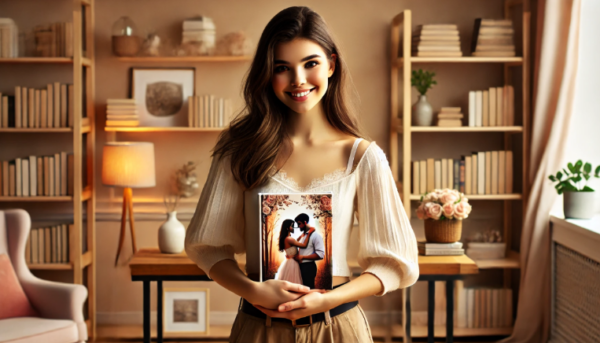Explore our comprehensive list of book genres, each designed to help you discover your next great read or find the perfect fit for your writing. From thrilling adventures to heartwarming tales, our diverse collection ensures there’s something for everyone.
Adventure novels involve exciting quests, danger, and exploration, often in unfamiliar and challenging environments.
Did you know? The adventure genre was especially popular in the 19th century as exploration and colonialism expanded worldwide.
The Must-Read: The Adventures of Huckleberry Finn by Mark Twain
This genre focuses on the world of visual arts, exploring techniques, history, and the influence of artists on culture.
Did you know? Art books can range from technical manuals to biographies and critical theory on visual culture.
The Must-Read: The Story of Art by E.H. Gombrich
These stories are tailored for young readers, featuring adventure, learning, and development in an accessible, engaging way.
Did you know? Picture books can have as few as 200–300 words but still tell rich, compelling stories for children.
The Must-Read: Charlotte’s Web by E.B. White
Comedy novels focus on humor, with characters and situations that are exaggerated for comedic effect and laughter.
Did you know? Comedy in literature often uses satire and irony to critique society and human behavior.
The Must-Read: The Hitchhiker’s Guide to the Galaxy by Douglas Adams
Focusing on recipes, techniques, and food culture, this genre inspires both the kitchen novice and expert chef alike.
Did you know? The first printed cookbook dates back to ancient Rome, called Apicius — a collection of Roman recipes.
The Must-Read: Mastering the Art of French Cooking by Julia Child
This genre includes guides on DIY projects, artistic hobbies, and creative crafting techniques.
Did you know? Craft books saw a resurgence with the DIY movement and social media platforms like Pinterest.
The Must-Read: The Creative Family by Amanda Blake Soule
This genre focuses on criminal activities, investigations, and justice. It often features detectives or law enforcement solving cases.
Did you know? The detective novel is one of the oldest genres, dating back to Edgar Allan Poe’s “The Murders in the Rue Morgue” in 1841, often considered the first modern detective story.
The Must-Read: The Godfather by Mario Puzo
These novels delve into myths, legends, and cultural tales, often blending folklore with creative storytelling.
Did you know? Mythological fiction often revives old stories, giving them new perspectives or modern themes.
The Must-Read: Circe by Madeline Miller
Design books explore the principles of creating functional and aesthetically pleasing products, spaces, and visual communication.
Did you know? Good design balances usability, aesthetics, and innovation to improve everyday life.
The Must-Read: The Design of Everyday Things by Don Norman
Focused on learning and personal development, these books offer insights into teaching, study methods, or personal growth.
Did you know? Educational books often use cognitive science research to improve teaching and learning effectiveness.
The Must-Read: The Power of Habit by Charles Duhigg
Books in this genre provide advice and stories about raising children, family dynamics, and relationships within the home.
Did you know? Parenting books often incorporate psychological research to provide evidence-based advice.
The Must-Read: The Whole-Brain Child by Daniel J. Siegel
Fantasy stories are set in magical worlds, often featuring mythical creatures, epic quests, and supernatural abilities.
Did you know? Fantasy literature often draws inspiration from ancient mythology and folklore from around the world.
The Must-Read: The Lord of the Rings by J.R.R. Tolkien
Fitness books provide guidance on physical health, exercise routines, and mental well-being to help readers achieve peak performance.
Did you know? Fitness literature often includes both scientific research and motivational techniques to encourage healthy habits.
The Must-Read: The Fitness Mindset by Brian Keane
History books delve into the events, figures, and cultures of the past, offering insights and lessons from earlier times.
Did you know? Modern history writing began to develop as a distinct academic discipline in the 19th century.
The Must-Read: The History of the Decline and Fall of the Roman Empire by Edward Gibbon
Horror stories evoke fear and discomfort, often involving supernatural or terrifying creatures and dark psychological themes.
Did you know? The genre’s popularity surged during the 18th century with the rise of Gothic novels, which combined horror and romance.
The Must-Read: The Shining by Stephen King
Humor books are intended to entertain and amuse, often with witty or absurd situations and characters.
Did you know? Humor can be a powerful tool for social commentary, often addressing serious topics through laughter.
The Must-Read: Bossypants by Tina Fey
This genre explores real-life stories, either from an individual’s own perspective or through a biographer’s lens.
Did you know? Memoirs differ from autobiographies by focusing on specific life experiences rather than a full life story.
The Must-Read: The Diary of a Young Girl by Anne Frank
These stories are full of suspense and unexpected twists, often involving a puzzle or crime that needs solving.
Did you know? The thriller genre has roots in Gothic fiction and often uses cliffhangers at the end of chapters to keep readers hooked.
The Must-Read: The Girl with the Dragon Tattoo by Stieg Larsson
Focusing on the natural world, this genre explores wildlife, ecosystems, and the beauty of nature’s wonders.
Did you know? Nature writing can blend science, observation, and personal reflection to deepen readers’ connection to the environment.
The Must-Read: The Hidden Life of Trees by Peter Wohlleben
This genre covers topics like spirituality, mindfulness, and metaphysics, often blending ancient wisdom with modern practices.
Did you know? The New Age movement grew rapidly in the late 20th century, combining elements from various spiritual traditions.
The Must-Read: The Power of Now by Eckhart Tolle
Philosophy books examine fundamental questions about existence, morality, knowledge, and human nature.
Did you know? Many philosophical texts were originally written as dialogues or conversations rather than essays.
The Must-Read: The Republic by Plato
Philosophy books examine fundamental questions about existence, morality, knowledge, and human nature.
Did you know? Many philosophical texts were originally written as dialogues or conversations rather than essays.
The Must-Read: The Republic by Plato
These books explore religious beliefs, practices, histories, and the impact of spirituality on human life.
Did you know? Religious texts are some of the oldest written works and have influenced literature, culture, and law worldwide.
The Must-Read: The Bible
Focusing on love and relationships, romance novels explore emotional connections, challenges, and happily-ever-afters.
Did you know? Romance is one of the largest book-selling genres worldwide, accounting for nearly 30% of all fiction sales.
The Must-Read: Pride and Prejudice by Jane Austen
Books in this genre explore the impact of technology and science on society, often blending real and speculative elements.
Did you know? Science and tech books sometimes predict future scientific breakthroughs long before they happen.
The Must-Read: Sapiens by Yuval Noah Harari
Fiction set in futuristic or alternative worlds, often involving advanced technology, space travel, or scientific advancements.
Did you know? Science fiction often explores social issues and philosophical questions through futuristic or alternative settings.
The Must-Read: Dune by Frank Herbert
Self-help books guide readers toward improving their personal lives, mindset, and relationships through practical advice and strategies.
Did you know? The self-help genre exploded in popularity after the 1960s, coinciding with cultural movements focused on self-empowerment.
The Must-Read: The 7 Habits of Highly Effective People by Stephen Covey
Travel books document journeys to new places, providing insights into culture, history, and personal experiences.
Did you know? Some travel books mix memoir, history, and geography to create rich, immersive narratives.
The Must-Read: In Patagonia by Bruce Chatwin



Ready to share your story?
Tell us what you need—we’ll help bring your book to life.
